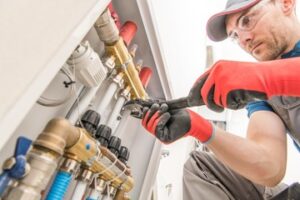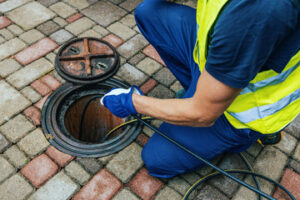The plumbing system in your home takes away waste, provides hot and cold water and regulates indoor climate. These functions are essential and should never be taken lightly.

Plumbers are tradespeople who specialize in installing and maintaining plumbing systems. They also inspect these systems to ensure they are working properly and complying with local codes. They often work with specialized tools and equipment, including video cameras for drain inspections. Contact Plumber Edison NJ for professional help.
Drain clenaing is the process of removing clogs from a pipe to ensure proper water flow. The plumber uses dedicated machinery to remove the clogs and restore normal water flow. This is a quick solution and suitable for new homes and drainage systems. However, the problem with this method is that it leaves behind remnants of clog particles that can jam the pipes in the future. This is why it is important to perform regular maintenance on your plumbing system.
You can prevent major clogs by regularly flushing your drain with boiling hot water. This will help to dissolve hair and grease that accumulates on the walls of your pipes. If this doesn’t work, you should call a professional to clear the blocked drain. You can also try using a commercial drain cleaner, but be careful that you use the correct instructions. Many of these products can cause severe damage to your pipes if used incorrectly.
A serious clog can cause major problems for your home or business, including water damage. If left untreated, it can result in flooding and costly repairs. To avoid this, you should take steps to prevent clogs from occurring in the first place. This includes reducing the amount of food scraps and oil that goes down your drains, as well as installing a garbage disposal in your kitchen.
Another step is to have your drains regularly cleaned and inspected by a professional. A professional can detect small issues before they become big problems. This is a great way to save money on costly repairs.
In some cases, it may be necessary to have your septic tank or sewer line cleaned. This can be caused by tree roots, clogged or broken drain lines, or grease build-up. These issues can be difficult to fix and require a professional’s expertise.
While a drain clog can be very frustrating, it’s important to deal with the problem quickly before it worsens. If you don’t, it can lead to costly plumbing repair and possible health risks. It’s also important to have a drain cleaning service performed at least once a year.
Drain cleaning
Drain cleaning is an important step in maintaining a functional plumbing system. It removes buildup that can cause clogs, slow drain flow, and even sewer backups. It’s also a great preventive measure to take before a serious problem occurs. By scheduling regular drain cleaning, you can avoid costly repairs and ensure your plumbing is functioning properly.
A professional plumber can help you determine the best drain cleaning method for your home. Depending on the type of clog, you may need a chemical cleaner or a mechanical process. Using a caustic or oxidizing chemical is the most common method for unclogging drains, but it can damage pipes if used over a long period of time. Mechanical methods, like a plumber’s snake, are effective for removing large clogs and can be safer for your pipes.
Most clogs occur in three areas: the curved sections of pipe called traps that exist underneath sinks, tubs, and toilets; the internal passages within toilets; and the main drain line leading away from your house. If you notice any of these issues, contact your plumber right away to schedule a drain cleaning service. A plumber can use a video inspection tool to identify the source of the problem and recommend the appropriate solution.
Getting a drain cleaned regularly can prevent clogs and other problems from occurring. Clogs typically develop over time, so it’s essential to have them addressed as soon as you notice them. A professional plumber can thoroughly clean your entire plumbing system, ensuring that all debris is removed and that water flows freely through the drains.
Clogged drains can be caused by a variety of things, including hair, food scraps, paper products, and even cigarette butts. Using a combination of baking soda, vinegar, and enzymatic cleaners can break down organic waste and help your drains function properly. It’s also important to dispose of trash properly, as items like cotton swabs, dental floss, and wipes can build up and clog your drains. By following these simple steps, you can keep your drains healthy and prevent future blockages.
Drain unblocking
Drains are not the most glamorous part of your home plumbing system, but they perform an important function. When they become blocked, they can stop water and waste from flowing through the pipes and into your sewage system. While some minor blockages may be resolved with hot water or baking soda, others require the more aggressive clog-clearing methods of a plumber.
Taking some preventative steps to keep your drains clear can go a long way in keeping them functional and preventing serious problems down the line. These steps can include not flushing items down the toilet that aren’t meant to be there, such as nappies, baby wipes, and sanitary products. You should also limit the amount of grease you put down your drains.
In many cases, a minor drain clog can be fixed with hot water or a plunger. More severe clogs can often be resolved with a drain snake, which uses a cable to break up the clog and dislodge it. If you have tried these DIY fixes, and the blockage persists, it is likely time to call a professional.
For a quick DIY drain unblocking solution, try pouring a cup of boiling water down the drain in stages, allowing each pour to soak into the blockage for a few seconds. This should dissolve soap scum and fats, and can be repeated as needed. If the problem doesn’t clear, try a natural enzyme-based cleaner like Bio-Clean, which dissolves hair, grease, and organic buildup. This cleaner can be bought at most hardware stores.
If these methods fail to work, you can try using a coat hanger to reach the clog and pull it out. It might take some effort, but this method is effective and inexpensive. Alternatively, you can use a wire snake, which is available from most hardware stores and comes in handheld and drill-attached options.
If these DIY unblocking methods don’t work, you can try using a caustic drain cleaner that is sold in most stores. This chemical takes on stronger action against fat, oil, and grease, making it ideal for more stubborn clogs. Always read the instructions and ventilate the room before applying this type of chemical.
Drain repair
Keeping drains in good repair is essential for the health of your home. Clogged drains can lead to water or sewage backups that require emergency plumbing services. If left unattended, these issues can damage the plumbing system and cause significant costs for repairs. To prevent damage, there are some simple steps you can take to keep your drains in tip-top shape.
The first step in drain repair is to find out what caused the problem. Plumbers use a variety of tools to diagnose problems and determine what needs to be repaired. These tools include video inspection equipment, which uses a camera on a long line to inspect pipes and determine the source of a blockage or leak. Plumbers also use specialized equipment to clean drains and remove clogs.
A clogged drain or pipe is often the result of soap, hair, and other debris building up in the plumbing system. Minerals in hard water can also build up and cause a clog. These problems can be difficult to fix without professional help.
If you notice foul odors coming from sinks, tubs, or toilets, it’s a sign of a serious issue with your drain and sewer lines. These smells are caused by a buildup of waste and can be dangerous to your health. A professional plumber should be able to solve the problem quickly and safely.
Another warning sign of a drain or sewer problem is standing water. This can be caused by a broken pipe or by ground shifting. Standing water can lead to mold and mildew, which can be dangerous for your family’s health. It is also a breeding ground for mosquitoes and other pests. A plumber can install a backflow prevention device to prevent this problem from occurring in your home.
While it’s tempting to ignore minor drain problems, you should always call a plumber as soon as possible. Delaying drain repair can lead to severe damage to your plumbing system and costly repairs. It is best to have a plumber inspect your drains regularly to ensure they are in good condition and working properly.
